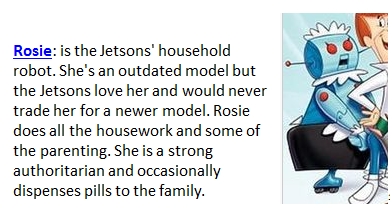Implications of the Personification
of Robots
Whether through anthropomorphization,
programming, or self-learning – the personification of robots will lead to
legal issues of robot liability. This liability will be studied through popular
fictional robotic characters.
Description
- Rosie
from the Jetson’s is one of the most people friendly and caring visions of robots
in the future. Her appearance is as a maid and somewhat matronly and she wears
a version of a uniform to cover most of her metal exterior. Her role in the
family is much like that of a nanny to both children and adult. Her sometimes
role as medication dispenser implies a similar characteristic to medi-doctors
or robo-dieticians.
Implications – Legally, using an
outdated model robot may void all warranties, and release the production
companies from liability, especially if this includes negecting vital software
updates. The utilization of a robot in childcare could hold the parents at risk
for negligence or neglect charges if the children do not receive adequate care.
Additionally, dispensing of medication to family members with short or no
proper diagnostic times creates a myriad of legal and ethical issues about
medical malpractice. Pharmecuetical companies may buy in with certain kinds of
robots and not others. Risk of bodily harm through overdose or prescription
interaction may occur. Robots of this nature may need to obtain licenses for
both childcare and medical practice. An out of date robot may not be able to
obtain an up date license. Software companies would need more than usual levels
of user testing and error checks before their product could be safely licensed
for home use.
Description – Bender is the “up to no good” cook at
Planet Express on Futurama. Bender’s appearance is all metal, but with human
proportionate arms, legs, torso, etc. He is a heavy drinker, yet that is
actually the fuel that he runs on, and can therefore be somewhat mitigated. His
love of stealing and desire to “kill all humans” imply the ability to have
empathy through his likes and dislikes, but simply choice not to feel bad for
others.
Implications – While Bender is obviously up to no
good, is it truly his fault? As brought up in one TV episode, he lacks the free
will to change due to his programming – so therefore he should lack the full
responsibility for his actions. Would the manufacturer or software developer then
be liable for all stealing and mayhem performed by this robot? Perhaps his
human characteristics to like and dislike would be considered free will to supersede
his initial programming, and hold him liable for criminal charges for his
actions. Due to a weakness to magnets, Bender’s inhibitions and judgment are
destroyed. If he committed a crime while in the presence of magnets, would this
cancel his culpability for the unlawful act – much in the way a human can be
found “Not guilty by reason of insanity.”
Description – Perhaps the ultimate in human imitation, Terminators are fully autonomous human killing machines. Able to mimic human abilities including voices and actions, they are the extreme copycat. Flesh and human fluids prevent easy detection by appearance, therefore stealth by mimicry is also a key component of these robots. Later models possess shape changing abilities in addition to the human appearance, and all models are programmed by the self aware artificial intelligence Skynet.
Implications – Assuming the
prohibitive costs of associated technology, it is not likely Terminator robots
would be mass produced to wipeout humanity in the beginning. Most likely
Terminators would have key targets to start with; strategic assasinations. If
lucky enough to avoid one of these assasination attempts, what would the
target’s liability be? Would people be able to prove identity theft by
Terminator and avoid consequences for all crimes and mayhem committed?
Questions arise as to what could be blamed on robot mimicry and what would be
the responsibility of the impersonated parties to prove. DNA testing may be
requireed to stay out of jail in even the most minor circumstances. And what
about the creation of Terminators? There are many reasons to promote the regulation
of self aware technologies to prevent such a disaster. Failsafe regulations may
be required to limit the harm of all robots, much like in the laws proposed by
Asimov.
Conclusion – Ultimately, for
all the shortcuts that we dream robots can create for us, neew issues in
liability and responsibility are also created. Laws may be the most prudent
regulator to inhibit the deployment of this technology by designating
consequences for errant actions.



No comments:
Post a Comment